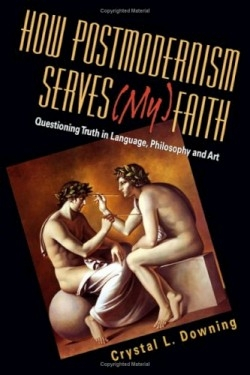How Postmodernism Serves (My) Faith
Questioning Truth in Language Philosophy and Art
The traveler risks the temptation of never returning home. The bright city lights seem alluring to the small-town girl, but ultimately those dangerous places and threatening lifestyles seem less threatening when she allows herself to enter in and have a good look around. If her home is strong in the first place, then she will eventually discover that there is, like Dorothy said, “no place like home.” In the introduction to this book, the author writes: “Those willing to enter the theater of postmodernism obviously see it in a radically different light from those who stand outside protesting that its performances are evil.”
Downing is an evangelical Christian and associate professor of English and film studies at Messiah College in Grantham, Pennsylvania. She has authored one previous book, on mystery writer Dorothy L. Sayers. Her purpose in writing this new book is twofold. She wants to find ways to free her fellow evangelicals from a sort of dead-end rigidity, which tends to isolate them from the world of philosophy and art. She also wants to use the techniques of Postmodernist philosophical enquiry to gain more meaning and respectability for her own faith.
Postmodernism has as many definitions as practitioners, but an essential concept for Downing is the notion of situatedness. Truth is always “situated,” according to Postmodernism. Even firsthand historical eyewitness accounts may not be entirely “true.” Everything relies on perspective. Where one was standing, what baggage one carries, how one was trained to see the world … all these factors bear on one’s relationship to “reality.”
After exploring situatedness in philosophy and art, Downing then turns the method on Christianity and reveals the “unsettling insight” that the Bible is not self-interpreting. “Humans must infer meaning even as they seek to extract God’s truth,” she writes. “And the meaning some humans infer can be … disturbing … such as when Christians justify segregation with ‘God separated the light from the dark.’” Here Downing cleverly illustrates the Postmodernist method at work on scripture. Even Biblical “truth” needs to be situated—read and interpreted intelligently.
Downing’s insights into philosophy and Christianity are largely trustworthy, and only become suspect when she attempts to oversimplify a very difficult point for the sake of clarity. This approach can seem disingenuous at times. Downing is nonetheless to be commended for her attempt to help evangelicals overcome the fear-driven approach to culture that has kept them locked inside their own little houses for far too long. At the same time she has shown a way for her own faith to be taken more seriously.
Reviewed by
Mark Smith
Disclosure: This article is not an endorsement, but a review. The publisher of this book provided free copies of the book to have their book reviewed by a professional reviewer. No fee was paid by the publisher for this review. Foreword Reviews only recommends books that we love. Foreword Magazine, Inc. is disclosing this in accordance with the Federal Trade Commission’s 16 CFR, Part 255.

